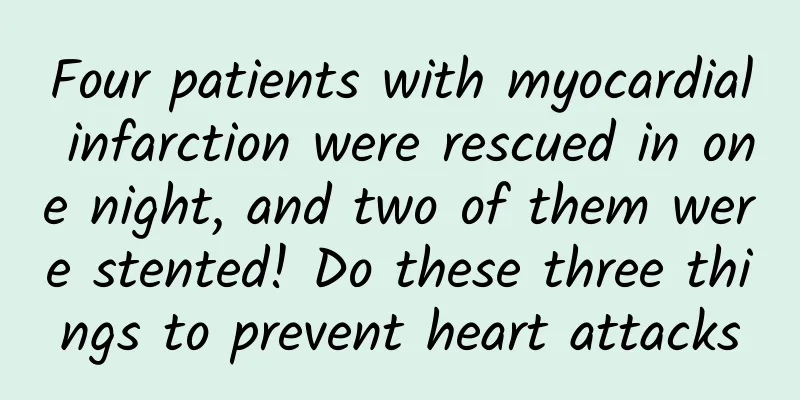Four patients with myocardial infarction were rescued in one night, and two of them were stented! Do these three things to prevent heart attacks

|
Four patients with acute myocardial infarction were rescued in one night shift, two of whom had stents placed, and the youngest was only 35 years old . The night shift in winter is considered a "nightmare" for cardiologists because heart disease is more prevalent in winter and the onset is sudden, making it more likely to induce myocardial infarction or even sudden death. Question 1: Why is heart disease more likely to occur in winter? Studies have shown that for every 10°C drop in temperature, the risk of heart disease increases by 7%. The weather is cold in winter. In order to maintain body temperature, the heart accelerates blood flow by increasing heart rate and contractility, which leads to increased myocardial oxygen consumption, inducing myocardial ischemia and even coronary artery spasm, causing angina pectoris or myocardial infarction. In addition, the high incidence of hypertension and respiratory diseases in winter will also increase the burden on the heart and induce heart disease. Question 2: To prevent heart attacks in winter, you need to do three things 1. Keep warm In winter, the indoor temperature should be between 18 and 24 degrees Celsius, not too low or too high. If the temperature difference between day and night and between indoor and outdoor is too large, it is easy to cause cardiovascular stress regulation and increase the burden on the heart due to temperature fluctuations, thus inducing myocardial ischemia. Heart disease patients should pay more attention to weather forecasts, add or remove clothing and adjust travel arrangements in a timely manner. In addition, they should avoid catching cold and wear masks to reduce the possibility of respiratory diseases such as colds and pneumonia inducing heart disease. 2. Eat a light diet In winter, the temperature is low and calorie consumption is high, so food intake also increases, which is more likely to cause high blood sugar and blood lipids and accelerate the progression of coronary heart disease. In addition, weight gain will also increase the burden on the heart and increase the risk of myocardial ischemia. Therefore, we should control our diet appropriately, eat less salt, less oil, less sugar, and eat more fresh fruits and vegetables. In addition, the elderly have poor gastrointestinal motility, so they can eat more coarse grains rich in dietary fiber to prevent constipation, because poor bowel movements and excessive force are common triggers of angina attacks. 3. Exercise moderately You can choose to exercise in the warm afternoon and avoid morning exercises. In addition, polluted weather is common in winter, so outdoor exercise should be moderate. Exercising in polluted weather will not only fail to achieve fitness effects, but will also inhale a large amount of harmful substances into the body, damage the respiratory and circulatory systems, and accelerate the progression of cardiovascular diseases. I am Dr. Zhang from the Department of Cardiology. If you like my popular science articles, please like them! You can also share them with friends in need! Follow me to see more health knowledge about heart disease! |
<<: Health Science, Understanding Diabetes
>>: A two-dollar erythromycin ointment can eliminate acne and also be used as a lip balm?
Recommend
How many days are there in 11 weeks of pregnancy
Pregnant women can feel the changes in their body...
Uterine fibroids can be treated with minimally invasive surgery
Uterine fibroids are a very common gynecological ...
Is it good for pregnant women to eat coix seed during childbirth?
As everyone knows, Job's tears is a nutrition...
The base makeup is not adhered well and there is dandruff
Are there always some situations where after putt...
Poor physical condition of girls
For girls, if their physical condition is poor, t...
What are the symptoms of vulvar burning pain
Female friends will suffer from various gynecolog...
Treatment of infertility caused by endocrine disorders
I believe everyone is familiar with the symptoms ...
What is the progesterone level at 40 days of pregnancy?
Generally, women need to pay special attention to...
Pregnancy belly feels a bit down
During different stages of pregnancy, the pregnan...
What is the best medicine for cervical anti-inflammatory
Cervicitis in women is a very common gynecologica...
How long should I apply potato slices to treat mastitis?
Among breast diseases, mastitis is the most commo...
How to treat moderate cervical erosion?
Cervical erosion is a relatively common gynecolog...
What causes irritability in early pregnancy?
Important reminder: In the early stages of pregna...
How to use medicine for candidal vaginitis
Nowadays, women are generally prone to gynecologi...









